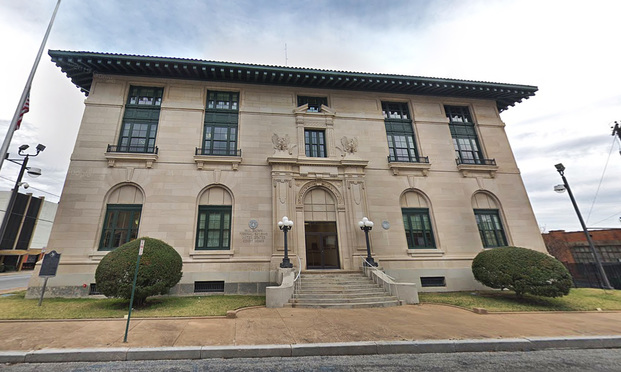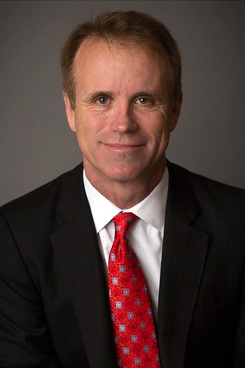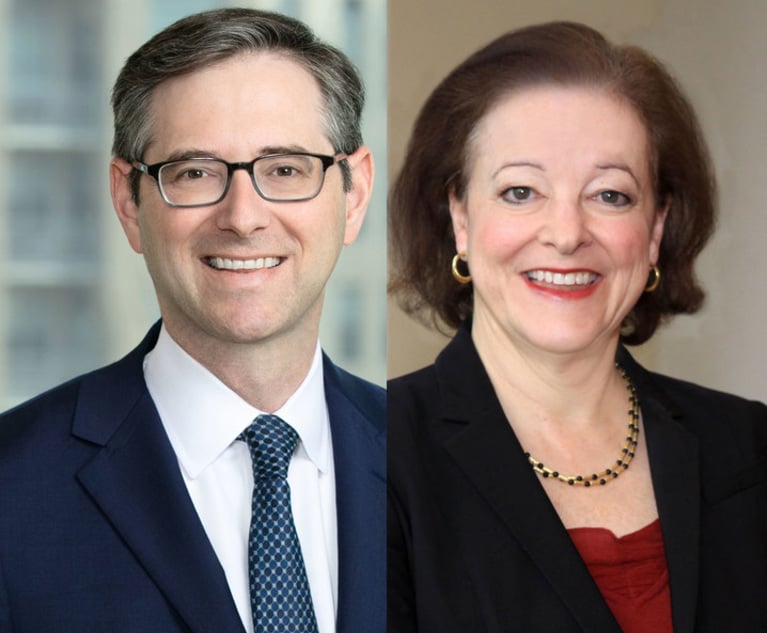Texas Attorney Reflects on First Civil Jury Trial in State During Pandemic
"I think it's very important for all of us to show a fair jury trial could be had during these uncertain times," said plaintiffs attorney Mark Underwood, who participated in a federal civil jury trial this week.
June 12, 2020 at 03:42 PM
5 minute read
 Paul Brown U.S. Courthouse in Sherman. Photo: Google
Paul Brown U.S. Courthouse in Sherman. Photo: Google
The plaintiffs attorney who handled Texas' first civil jury trial this week after coronavirus court closures said he didn't question his safety, but wouldn't do it again next week because of recent news about spikes in infections.
Mark Underwood, owner of the Underwood Law Office in McKinney, represented plaintiffs in a slip-and-fall case that went to trial this week. Jury selection was Monday, and the trial was Tuesday and Wednesday, according to the hearing schedule for Judge Amos Mazzant of the U.S. District Court for the Eastern District of Texas in Sherman.
Although Underwood's clients lost the trial—the jury found the defendants weren't negligent for their injuries—he told Texas Lawyer that he was glad to participate to show the country that jury trials can still be held safely.
Texas Lawyer talked to Underwood about the trial. Here are his answers, edited for brevity and clarity.
Texas Lawyer: Why did you agree to move forward with this jury trial during the pandemic?
 Mark Underwood, Underwood Law. Courtesy photo
Mark Underwood, Underwood Law. Courtesy photoMark Underwood: With everything going on right now with the protests, it brings home the fact our constitutional rights are important. All of them are equally important.
I think everybody involved, from the judge to the jurors, to the court staff, to all the attorneys involved, really saw an opportunity to take a stand that our constitutional right to a jury trial is that important. I think it's very important for all of us to show a fair jury trial could be had during these uncertain times.
We'll see what happens over the next two weeks. Hopefully, God willing, everyone will be healthy. Everyone was brave. When we spoke to the jurors after, a couple teared up, when talking to them about being brave, and paying attention, staying there, not wanting to get off the jury panel and the courage it took to not try to get out of jury duty during a pandemic.
What were the precautions against infection during the jury selection?
It was different during jury selection than the rest of the trial. Jury selection was the most crowded point.
The precautions were they had the panel in the gallery. They sat them about six feet apart.
They staggered people all the way back. Everybody wore masks.
I asked them is there anyone so worried about the coronavirus that they don't want to be on the jury. Not one person raised their hand.
Did you still feel confident of picking the jury when you couldn't see their faces?
It was okay. I would not change that—because of safety.
How did everyone in court maintain social distancing during the proceeding?
First thing is witnesses on the witness stand did not use masks. The judge said he did not want the witnesses in the witness stand covering their faces, because he felt it was important for the jurors to be able to judge their testimony and credibility.
Lawyers were restricted to the podium and did not wear masks. The jurors—it was an eight-person jury—only one wore a mask the whole time.
The courthouse and courtroom were built in 1909. It's a very old courtroom, out of the movies, and lots of room to move around. The lawyers were restricted to the podium and the court staff wiped everything down at every break.
Occasionally, the judge had to remind the lawyers we couldn't approach the jury because of the coronavirus.
Was everyone happy with the social distancing measures, so felt they didn't need masks?
I was worried about counsel table. But it's such a large counsel table—I was probably 10 feet from my client. There was plenty of room.
On the first day of trial, they checked everyone's temperature that came in the courthouse. I really appreciated that. They didn't do it the second and third day of trial and I wish they had.
What was your overall opinion about your own safety against infection during the trial?
During the trial, I never had any questions about my safety. After the trial, I started thinking about it and second-guessing myself a little bit. I have a 12-year-old son who I want to be around to raise. But the further I get away from the trial, the more I'm convinced it was a good decision to go to trial.
Would you do it again, and why?
I would not do it again next week, but I would do it again in a month. With all the social distancing that did not occur over the Memorial Day weekend and with all the protests, I see the infection rate spiking in Texas, and I think it's going to continue to spike for a while as a result of the lack of social distancing. I think it will actually be more dangerous in two, three weeks, than what it was right now.
But it can be done. Clearly, it can be done.
This content has been archived. It is available through our partners, LexisNexis® and Bloomberg Law.
To view this content, please continue to their sites.
Not a Lexis Subscriber?
Subscribe Now
Not a Bloomberg Law Subscriber?
Subscribe Now
NOT FOR REPRINT
© 2025 ALM Global, LLC, All Rights Reserved. Request academic re-use from www.copyright.com. All other uses, submit a request to [email protected]. For more information visit Asset & Logo Licensing.
You Might Like
View All

Eversheds Sutherland Adds Hunton Andrews Energy Lawyer With Cross-Border Experience
3 minute read
Ex-Marathon General Counsel Takes Legal Reins of Another Energy Company

After Nearly 2 Decades in the Role, Longtime Haynes and Boone General Counsel Passes the Baton
3 minute readTrending Stories
- 1'It's Not Going to Be Pretty': PayPal, Capital One Face Novel Class Actions Over 'Poaching' Commissions Owed Influencers
- 211th Circuit Rejects Trump's Emergency Request as DOJ Prepares to Release Special Counsel's Final Report
- 3Supreme Court Takes Up Challenge to ACA Task Force
- 4'Tragedy of Unspeakable Proportions:' Could Edison, DWP, Face Lawsuits Over LA Wildfires?
- 5Meta Pulls Plug on DEI Programs
Who Got The Work
Michael G. Bongiorno, Andrew Scott Dulberg and Elizabeth E. Driscoll from Wilmer Cutler Pickering Hale and Dorr have stepped in to represent Symbotic Inc., an A.I.-enabled technology platform that focuses on increasing supply chain efficiency, and other defendants in a pending shareholder derivative lawsuit. The case, filed Oct. 2 in Massachusetts District Court by the Brown Law Firm on behalf of Stephen Austen, accuses certain officers and directors of misleading investors in regard to Symbotic's potential for margin growth by failing to disclose that the company was not equipped to timely deploy its systems or manage expenses through project delays. The case, assigned to U.S. District Judge Nathaniel M. Gorton, is 1:24-cv-12522, Austen v. Cohen et al.
Who Got The Work
Edmund Polubinski and Marie Killmond of Davis Polk & Wardwell have entered appearances for data platform software development company MongoDB and other defendants in a pending shareholder derivative lawsuit. The action, filed Oct. 7 in New York Southern District Court by the Brown Law Firm, accuses the company's directors and/or officers of falsely expressing confidence in the company’s restructuring of its sales incentive plan and downplaying the severity of decreases in its upfront commitments. The case is 1:24-cv-07594, Roy v. Ittycheria et al.
Who Got The Work
Amy O. Bruchs and Kurt F. Ellison of Michael Best & Friedrich have entered appearances for Epic Systems Corp. in a pending employment discrimination lawsuit. The suit was filed Sept. 7 in Wisconsin Western District Court by Levine Eisberner LLC and Siri & Glimstad on behalf of a project manager who claims that he was wrongfully terminated after applying for a religious exemption to the defendant's COVID-19 vaccine mandate. The case, assigned to U.S. Magistrate Judge Anita Marie Boor, is 3:24-cv-00630, Secker, Nathan v. Epic Systems Corporation.
Who Got The Work
David X. Sullivan, Thomas J. Finn and Gregory A. Hall from McCarter & English have entered appearances for Sunrun Installation Services in a pending civil rights lawsuit. The complaint was filed Sept. 4 in Connecticut District Court by attorney Robert M. Berke on behalf of former employee George Edward Steins, who was arrested and charged with employing an unregistered home improvement salesperson. The complaint alleges that had Sunrun informed the Connecticut Department of Consumer Protection that the plaintiff's employment had ended in 2017 and that he no longer held Sunrun's home improvement contractor license, he would not have been hit with charges, which were dismissed in May 2024. The case, assigned to U.S. District Judge Jeffrey A. Meyer, is 3:24-cv-01423, Steins v. Sunrun, Inc. et al.
Who Got The Work
Greenberg Traurig shareholder Joshua L. Raskin has entered an appearance for boohoo.com UK Ltd. in a pending patent infringement lawsuit. The suit, filed Sept. 3 in Texas Eastern District Court by Rozier Hardt McDonough on behalf of Alto Dynamics, asserts five patents related to an online shopping platform. The case, assigned to U.S. District Judge Rodney Gilstrap, is 2:24-cv-00719, Alto Dynamics, LLC v. boohoo.com UK Limited.
Featured Firms
Law Offices of Gary Martin Hays & Associates, P.C.
(470) 294-1674
Law Offices of Mark E. Salomone
(857) 444-6468
Smith & Hassler
(713) 739-1250






